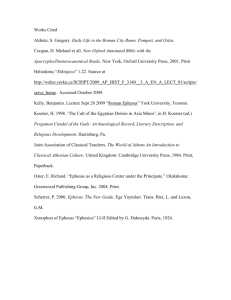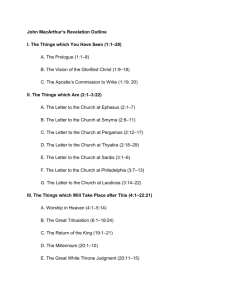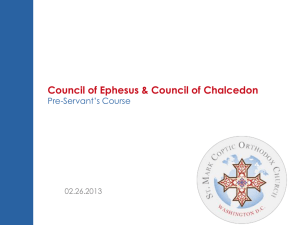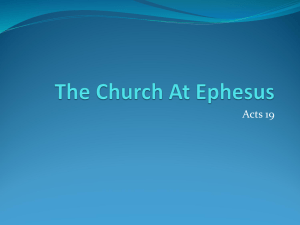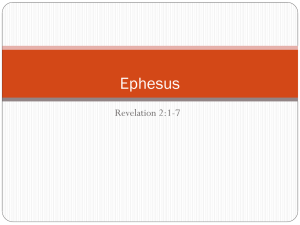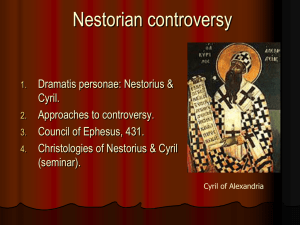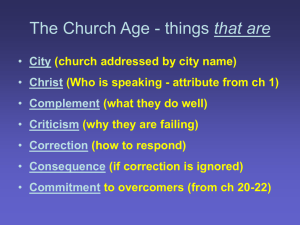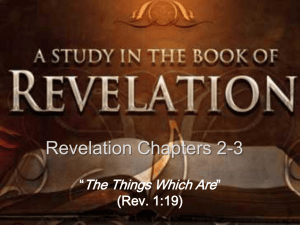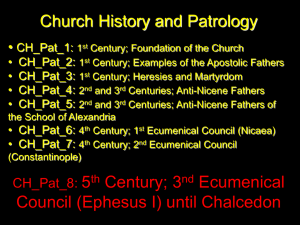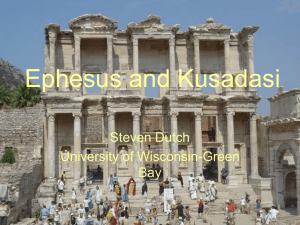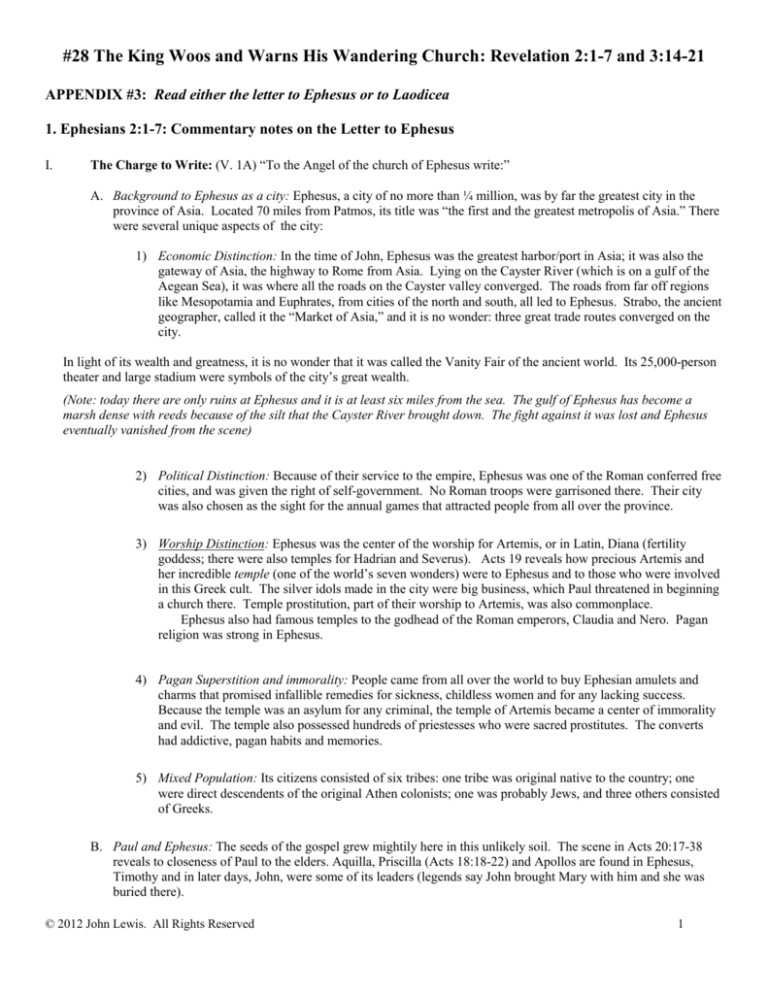
#28 The King Woos and Warns His Wandering Church: Revelation 2:1-7 and 3:14-21
APPENDIX #3: Read either the letter to Ephesus or to Laodicea
1. Ephesians 2:1-7: Commentary notes on the Letter to Ephesus
I.
The Charge to Write: (V. 1A) “To the Angel of the church of Ephesus write:”
A. Background to Ephesus as a city: Ephesus, a city of no more than ¼ million, was by far the greatest city in the
province of Asia. Located 70 miles from Patmos, its title was “the first and the greatest metropolis of Asia.” There
were several unique aspects of the city:
1) Economic Distinction: In the time of John, Ephesus was the greatest harbor/port in Asia; it was also the
gateway of Asia, the highway to Rome from Asia. Lying on the Cayster River (which is on a gulf of the
Aegean Sea), it was where all the roads on the Cayster valley converged. The roads from far off regions
like Mesopotamia and Euphrates, from cities of the north and south, all led to Ephesus. Strabo, the ancient
geographer, called it the “Market of Asia,” and it is no wonder: three great trade routes converged on the
city.
In light of its wealth and greatness, it is no wonder that it was called the Vanity Fair of the ancient world. Its 25,000-person
theater and large stadium were symbols of the city’s great wealth.
(Note: today there are only ruins at Ephesus and it is at least six miles from the sea. The gulf of Ephesus has become a
marsh dense with reeds because of the silt that the Cayster River brought down. The fight against it was lost and Ephesus
eventually vanished from the scene)
2) Political Distinction: Because of their service to the empire, Ephesus was one of the Roman conferred free
cities, and was given the right of self-government. No Roman troops were garrisoned there. Their city
was also chosen as the sight for the annual games that attracted people from all over the province.
3) Worship Distinction: Ephesus was the center of the worship for Artemis, or in Latin, Diana (fertility
goddess; there were also temples for Hadrian and Severus). Acts 19 reveals how precious Artemis and
her incredible temple (one of the world’s seven wonders) were to Ephesus and to those who were involved
in this Greek cult. The silver idols made in the city were big business, which Paul threatened in beginning
a church there. Temple prostitution, part of their worship to Artemis, was also commonplace.
Ephesus also had famous temples to the godhead of the Roman emperors, Claudia and Nero. Pagan
religion was strong in Ephesus.
4) Pagan Superstition and immorality: People came from all over the world to buy Ephesian amulets and
charms that promised infallible remedies for sickness, childless women and for any lacking success.
Because the temple was an asylum for any criminal, the temple of Artemis became a center of immorality
and evil. The temple also possessed hundreds of priestesses who were sacred prostitutes. The converts
had addictive, pagan habits and memories.
5) Mixed Population: Its citizens consisted of six tribes: one tribe was original native to the country; one
were direct descendents of the original Athen colonists; one was probably Jews, and three others consisted
of Greeks.
B. Paul and Ephesus: The seeds of the gospel grew mightily here in this unlikely soil. The scene in Acts 20:17-38
reveals to closeness of Paul to the elders. Aquilla, Priscilla (Acts 18:18-22) and Apollos are found in Ephesus,
Timothy and in later days, John, were some of its leaders (legends say John brought Mary with him and she was
buried there).
© 2012 John Lewis. All Rights Reserved
1
II.
The Character of Christ: (V. 1B) “The One who holds the seven stars on His right hand, the One who walks among the
seven golden lamp stands says this:”
A. “The One who holds the seven stars on His right hand”
1. holds: this is a strong word in Greek, and it is in present tense. Christ has complete control over his church.
Idea here is that the whole (i.e., all the seven stars) church is grasped in His hand.
B. “the One who walks among the seven golden lampstands says this:”
1. The lamp stands: they are the churches (see the last verse of ch. 1). They hold the light, but aren’t the light.
2. walks: this is present tense. He is in their midst, aware of activities. There is the idea of an inspection here.
III.
The Commendation: (Vv. 2-3, 6) “I know:..”
A. “your deeds:” see Acts 19:8-40 for some of what they did.
B. “and your toil”: this a favorite NT word. See Rom. 16:12, 1 Cor. 15:10, Gal. 4:11. It is the kind of toil which
takes everything of mind and sinew that a person can put into it.
C. “and your perseverance” (Gr. Hupomone): this is an often repeated word in Revelation. The idea here is
courageous and hopeful gallantry, not grim patience that resigns to suffering.
D. “and that you cannot endure evil men:” the size and importance of Ephesus and its location made it especially
susceptible to itinerant frauds and false teachers, especially in the Gentile section where there was no OT
background. Language was easily twisted and distorted, leading people astray.
E. “And you put to the test” those who call themselves apostles” Who were they? Judaizers? Nicolations? We don’t
know.
F. You found them false (i.e., the men above)
1. Background: Remember that Jesus promised false teachers would come: Matt. 7:15. Paul did, too, even in
Ephesus (Acts 20:29). He also commanded doctrine to be tested: 1 Thes. 5:21, 1 Cor. 14:29, 1 Jn. 4:1.
2. Several kinds of false teachers existed:
a. those who sought to entangle Christians in the law.
b. professional beggars who preyed the charity of Christian congregations.
c. those who tried to turn liberty into license.
G. (v. 6) “Yet this you do have, that you hate the Nicolations,”
1. Who are they? There is no description here. It’s a mystery. This group lasted only a short time. They are
mentioned in the letter to Pergamum (v. 15) and are connected closely with those who hold to the teaching
of Balaam. Early church tradition has Nicolas as one of the seven deacons in Acts 6:5, that somehow he
went wrong and became a heretic. His teachings are associated with unrestrained indulgence, uncleanness,
departed from correct doctrine, loose living. Eating things offered to idols and with immorality were
potential disagreements with the church as well (these same problems exist in Thyatira with Jezebel:
indirect reference in v. 20-1). Pagan practices were allowed in the spirit of Christian liberty, which led to
compromise of the faith.
2. Early church: Acts 15:28-9 states that two of the conditions that would keep Gentiles from being admitted
to the church were abstaining from immorality and eating foods offered to idols. These are the 2
commands the Nicolations broke.
3. Balaam: from 2:14f:
a. Numbers 25:1-5, 31:16: Balaam stood in Israel from that time as a name for an evil man who seduced
people to sin.
b. Play on words here: Nicolas, founder, comes from two Greek words: niko, to conquer, and laos,
people. Balaam comes from two Hebrew words: bela, to conquer, and ha’am, the people. The two
names are the same in meaning. Both names here are used to describe an evil teacher who won
victory over people with their enslaving heresy.
© 2012 John Lewis. All Rights Reserved
2
c.
Probable doctrine of Balaam:
i.
The law is ended: we can therefore do what we like.
ii.
Body is evil; do what you like because it did not matter. Separation of body and soul (Greek
thought) lead to compromise via immoral behavior.
iii.
Christians are so rescued by grace that they can do anything and receive no harm.
d. Opportunities for immorality: sexual relationships outside of marriage were completely normal (part of
social occasions!) The rich upper class were most challenged by the demands of Christ to be radically
different than the world.
IV. The Concern: (v. 4) “You have left your first love.”
A. Left: Possible meanings of this word are to become less intense, relax, to desert, leave, forsake, omit, pass by.
B. Love: Question: is this Love for God and/or love for people?
1. Love of God: Jer. 2:2 God remembers Israel’s former “devotion of your youth, your love as a bride.” The
honeymoon of the promised land (here: start of their church!) had passed, other gods had infiltrated the church.
2. Love for fellow believers: in the early days they had really loved each other. In a climate of constant suspicion,
the focus changed from love to pure doctrine/orthodoxy.
3. The heresy Paul warned about may have been removed and orthodoxy established, but the price was love and
fellowship.
4. Love for the heretics/lost: in seeking to be doctrinely pure against heresy, had they sacrificed the love of their
“enemies?”
5. Though the three loves here are related and all possibly included here, this love for each other and the lost are
more likely the emphasis. Besides this text (Rev. 2:1-7), see following passages: Acts 19/20, 1/2Timothy,
Ephesians.
6. Parallel Passage: 1 Cor. 3:1-3.
7. Conclusion: Seeking pure doctrine, doing good works, resisting false teachers are good but never to be
disconnected from love of our neighbor. In a world of idols and untruth, seeking to preserve or defend
orthodoxy can lead us to the very temptation of leading a loveless life. as our response to being saved.
V. Correction: (v. 5)
A. “Remember from where you have fallen”
1. Present tense: this is to be a continual command/attitude.
2. Hebrew people believed that we bring the past to the present when we remember.
3. Comparison: Luke 15:17: prodigal son had been lost, but had a memory that helped the past come to the
present and brought him back to his first love. And Repent: Aorist tense: decisive break. Luke 15:18, e.g. “I
have sinned . . .I will go back .” Remembering is the 1st step toward coming home and of repentance.
B. “And Do the deeds”… The ones you did at first .
VI. Consequences: warnings and/or blessings
“If you don’t, Christ will remove your lampstand.” This will happen now/immediately, not just at second coming.
VII. Call: (v. 7A) “He who has ears . . .”
VIII. Challenge: (v. 7B):
A. Condition: “To him who overcomes,”
B. Promise: “I will grant the tree of life”
1. What is the tree?
a. Of Life: eat its fruit and you will live forever. That is why it was guarded after the fall. The tree is
symbolic of God as the source of eternal life.
© 2012 John Lewis. All Rights Reserved
3
b. Jewish conception: the tree of life would again be in the midst of people when the Messiah came and the
new age dawned. The faithful would eat of it. The rabbis taught of a tree of life whose boughs, fruit and
aromas would fill the whole of paradise. What Adam had lost, the Messiah would restore. To eat of the
tree of life then means to eat the joyful fruit as one who is with Christ when He reigns supreme.
In apocalyptic thought, the tree of life was a reward for the righteous following the judgment of the
wicked.
c.
Rev. 22:2 speaks of the tree of life continually bearing fruit in the heavenly Jerusalem.
2. Where is it? “which is in the Paradise of God.”
a.
Paradise:
i.
The picture is the Garden of Eden where God walked among the trees with Adam (Gen. 2:9, 16-7:
see Character of Christ above), where Adam was banished so that the tree of life was lost forever.
ii.
In Revelation, it is the eschatological state in which God and people are restored to the perfect
relationship of Gen. 1 and 2.
iii.
Conclusion: Paradise was not heaven according to the early great thinkers. This later changed and
we now equate Paradise with heaven.
2. Revelation 3:14-21: Commentary notes on the Letter to Laodicea
I.
Charge to the Church Addressed: v. 14a “And to the angel of the church in Laodicea write:”
A. Background: It was a strategic city founded about 250 BC by Anitochus of Syria and named after his wife Laodice
(Modern name “Eski-hisar, “the old fortress”). Its importance was due to its position; it was on the main road to
the east from Ephesus, on the juncture between two great imperial trade routes. All travelers had to pass by
Laodicea to get to Phrygia and over the mountains. The city lay on a plateau several hundred feet high several
miles from the Lycus River.
There were a variety of unique aspects of this distinguished city:
1. A great banking and financial centre. Agricultural and commercial prosperity made it one of the
wealthiest cities in the world. E.g., after the AD 61 earthquake, the citizens rebuilt their city on their own
funds.
2. Clothing manufacturer: the specially bred sheep that grazed the fertile valley surrounding Laodicea were
high in demand and famous for their soft, violet black glossy wool. It mass produced cheap outer
garments, especially the tunic called the trimita (so much so that the city was sometimes called
Trimatiaria. )
3. It was a very considerable medical centre. The temple of the Carian god stood thirteen miles away, and
was the social, administrative and commercial center of the whole area. The temple was specifically the
center of a medical school which was later transferred to Laodicea itself. The doctors were famous; some
even appeared on the city’s coins. The school was known worldwide for two things: ointment for the ear
and ointment for the eyes.
4. Water: The major weakness of the city was its lack of an adequate and convenient source for water. Its
location had been determined by the road system rather than the natural resources. They piped in water
from the springs near Denizili (six miles to the south) through a system of stone pipes that were three feet
across and hollowed in the middle. It was easy to cut off the city’s water supply; this made them
vulnerable to their enemies (siege, e.g.), especially in their dry season. Under the protection of the
Romans, they were set to prosper.
This water contains calcium carbonate (deposits can still be seen in pipes today). People who drank
this lukewarm water became sick; it was distasteful.
5. Miscellaneous: The Church was probably founded here during Paul’s third missionary trip (In Col. 4:17,
Archippus is charged to fulfill his ministry here. A letter from Paul was sent here but it is lost for us).
© 2012 John Lewis. All Rights Reserved
4
II.
The Character of Christ: v. 14b “The Amen, the faithful and true Witness, the Beginning of the creation of God, says
this:”
A. “The Amen”- This a unique title
1. This word was used at the end of sentence to guarantee truth of what was just said. Jesus in his teaching, e.g.
“Truly truly I say to you, Amen, Amen….”
2. OT/Judaism: Amen is the acknowledgment of that which is personally binding. As a personal name it would
suggest that the one so named is in perfect conformity to reality.
3. The titles that follow continue to elaborate on the meaning of “the Amen.”
4. This title was implied in Rev. 1 in Jesus being described as the one who is being seen by John.
B. “The Witness, Faithful and true:” God will do what He says He will do. This title was implied in Rev. 1 in that that
the judgment Jesus will one day bring comes from God himself. The vision of the future is therefore reliable and
true.
C. “The Beginning of the creation of God:” The author of creation has authority over the same. This title was implied
in Rev. 1 in Jesus’ title as the alpha and Omega.
III.
IV.
Commendation: None. This suggests something about the state of this church.
Condemnation: vv. 15-17
A. “You are neither hot nor cold.” Background: the hot springs of Hierapolis-their water source that was nearly six
miles away-were famous for their healing party and a spectacular natural phenomenon. As the hot water traveled
across the mountain surface, it gradually became lukewarm before dropping off the mountain’s edge. This water
could not be enjoyed for its healing properties nor could it be drunk!
B. “I would that you were cold or hot”
1. Some say that cold, hot and lukewarm are descriptions for the spiritual fervor of the Laodicean church. Green
and Rudwick argue that there is rather a contrast between the hot medicinal waters of Hierapolis and the cold
purer waters of Colossae. It provided neither healing (mineral water) nor refreshment (cold water) for those in
need. The issue is on the barrenness of its works, not its spiritual temperature. This helps explain why Christ
might want the church to be cold before it is lukewarm. Yet note that he asks them later to be zealous/eager,
which comes from the root “hot.”
C. “Because you are neither hot or cold, but lukewarm, I will spit you out of my mouth.”
a.
Lukewarm warm, tepid (Webster’s dictionary: “Marked by am absence of enthusiasm of conviction).
D. Reasons for v. 18 and 19 correction (V):
1. “Because you say,”
a. ‘I am rich:’ Again, there was tremendous wealth financially but the richness boasted here is spiritual.
b. “and have become wealthy,” i.e., they did it on their own!
c. “and have need of nothing,” compare with Luke 12:19 parable.
2. “And you do not know that you are”
a. “wretched:” idea of miserable, distressed, an enduring trial
b. “miserable:” Webster’s: Being in a pitiable state of distress or unhappiness; arises from extreme distress or
poverty of mind or body.
c. “poor, blind, naked,”
d. five adjectives for basically the “same” idea/condition.
e. You is emphasized in Greek.
IV.
Correction: vv. 18-19: “I advise you to buy from me gold refined by fire, that you may become rich, and white
garments, that you may clothe yourself, and the shame of your nakedness may not be revealed, and eye salve to anoint
your eyes, that you may see. Those whom I love, I reprove and discipline; be zealous therefore and repent.”
A. “I advise you to buy”
1. “from me”: this is emphasized in Greek.
2. Three things they are to buy:
© 2012 John Lewis. All Rights Reserved
5
3. item #1: “gold that you may become rich,”
a. “refined by fire,” which means it is pure of dross.
b. Large Jewish population levied taxes and asked for it in gold since Jews did not accept local current item
4. #2: “white garments”
i. Is this in contrast to their famous black garments? Perhaps the better meaning: white = righteousness:
see Rev. 3:4, 4:4, 6:11, 7:9, 13-4, 19:14.
ii. purpose of garments: “that you may clothe yourself”
aa. It is an honor to receive fine clothing: EG., Joseph from Pharaoh and father, Mordecai (Esth.
6:6).
bb. “and that the shame of your nakedness may not be revealed.”
iii. nakedness in Bible is symbol of judgment and humiliation. (Is. 20:1-4, 2 Sam. 10:4, Ezek. 16:37-9).
item #3: “eye salve to anoint your eyes”
i. salve: literally, “a little roll of bread.” Their famous Phrygian powder was exported all over the world
in solidified tablet form in the shape of little rolls. It was mixed with water and smeared on eyes.
ii. purpose #3: “you may see.” They suffered from spiritual blindness; they could not see their need, and
this was the cost for the above items.
5. Conclusion: Note the irony here! The correction is that they make “purchases” in the areas they think they you
have no needs.
B. 2 acts of Jesus:
1. “I reprove and discipline”
a. Bible: Ps. 94:12, Job 5:17, 1 Cor. 11:32, Heb. 12:7-8 and Proverbs.
b. Hebrew word idea: to train up, educate (broadly) a child.
2. who? “those whom I love.”
a. See further Prov. 3:11-2, Heb. 12:5-6
b. Greek word suggests a tender affection as motivation for reproof!
3. Sentence puts emphasis on “I” and “as many as” (inclusive, without exception).
C. Conclusion: 2 final exhortations.
1. “therefore:” a response to B and everything else above.
2. #1: “be zealous:”
a. Present tense imperative which means this is a habit we are to practice continuously
b. Greek idea is to seek/desire eagerly. Zeal in Webster’s dictionary adds eagerness, ardent interest in
pursuing something.
3. #2: “and repent:” here, verb tense means one decisive act.
V.
Challenge and Consequences:
v. 20: “Behold I stand at the door and knock; If anyone hears my voice and opens the door, I will come in to him, and
will dine with him, and he with Me.”
A. The door was that of the church
1. In their blind self sufficiency they had excommunicated the Lord from their midst. He then amazingly and
humbly asks permission to reenter.
B. Invitation: “If anyone . . .”
1. Is this invitation personal or for the church? For the present or for the future when Christ returns?
a. If v. 20 is tied to the promise of v. 21, it seems sure that the invitation is future oriented. If it is tied to the
repent command, then it seems more present.
b. It seems that “he that overcometh” usually opens up a new section, and that verse 20 more naturally flows
out of verse 19 and repentance.
c. While the application then seems to fit more for the present and for the church as a whole, it is hard not to
see that 1) individuals also needed to repent and 2) that there is some sense of the eschatological kingdom
and feast in the language of verse 20.
d. See Mt. 26:29, Rev. 19:9
© 2012 John Lewis. All Rights Reserved
6
C. “Dine:” The New age was to begin with a banquet of the Messiah and the redeemed. This was a common theme in
the NT and the intertestamental period.
VI.
The Call: v.21 “He who overcomes I will grant him to sit down with Me on My throne as I also overcame and sat
down with my Father on His throne.”
A. His throne is the Father’s: Rev. 22:1.
B. The pattern for the church of death first and then exultation is the same as Jesus’. He overcame the temptation to
go the easy way the Devil suggested in the wilderness by deciding in Gethsamane (and continuously) to go God’s
hard/cross way before He was exalted. He was “hot,” zealous as a result.
VII.
Charge: v. 22: “He who has ears, let him hear what the Spirit says to the churches.”
© 2012 John Lewis. All Rights Reserved
7

